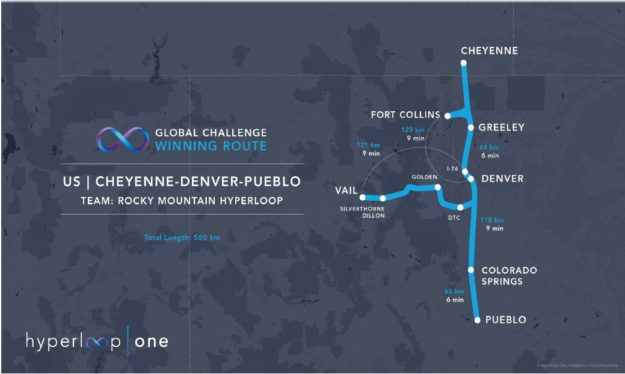Widgetized Section
Go to Admin » Appearance » Widgets » and move Gabfire Widget: Social into that MastheadOverlay zone
Snuff out Olympic torch dreams now unless Colorado gets a shiny, new Hyperloop

Courtesy of Hyperloop One.
I hate to think of it, but some of Vail’s founders must be doing barrel rolls in their graves right now as the United States Olympic Committee in Colorado Springs weighs a possible 2026 or 2030 Winter Olympic bid, which could include Colorado, and Vail’s newspaper of record slams the idea in an editorial.
Sorry, Vail Daily, but I beat you to the punch in a blog post on Sept. 13.

The O. Zone
by David O. Williams
I interviewed Pete Seibert on multiple occasions, and the late Vail founder never got over the fact that Denver, awarded the 1976 Winter Games by the International Olympic Committee in the early 70s (with Vail and the yet-be-built Beaver Creek as likely venues), later rejected spending taxpayer money on the Games. He rightly blamed a then state legislator named Dick Lamm, who later became governor.
Lamm feared runaway growth, massive public debt and overall environmental degradation of the Colorado Rockies. The growth — and some would argue enviro damage — came anyway, but the state did dodge the debt that plagued other venues such as the 1976 Montreal Summer Games, and Colorado remains the only venue to get the Games and then give them back.
Vail marketing genius Bob Parker — remembered for all his many contributions at a memorial last week — and early infrastructure guru and tireless ski and ski-racing advocate Byron Brown (who will be remembered at the Ford Amphitheater on Friday) were among the many Vail pioneers who recognized the international marketing value of hosting ski races and pushed endlessly for events like the World Alpine Ski Championships. Vail has hosted them three times, and they’re second only to the Olympics in terms of alpine racing prestige.
So it seems somehow disrespectful to those great visionaries to now decry what the Olympics have become and advocate for the Games to be held elsewhere.
I’ll never forget veteran Vail Valley journalist Kathy Heicher telling me how as a young reporter in Eagle in the 70s she once naively traipsed into a meeting of Vail luminaries discussing the 1976 Denver Games and said she thought it was a bad idea — for a lot of the same reasons Lamm espoused. Needless to say, she received a chilly response of Olympian proportions.
I’ve discussed the modern Games with Lamm, who now teaches at the University of Denver, and he’s surprisingly not nearly as dead-set against the Winter Olympics now. But he would only want to see them come to Colorado if they’re massively scaled back and lead to meaningful infrastructure fixes.
And therein lies the problem with the modern Olympic movement. The IOC has tried to address the concerns of western Democracies that the Games have become far too large and far too expensive — especially in the wake of the $50 billion Russia spent for the Sochi Games in 2014 — but most cities controlled by a leery electorate don’t buy that the Olympics can downsize and still improve infrastructure.
When Seibert and Parker and Brown and George Gillett and so many others eyed the Olympics as a panacea for the Vail Valley, things were different. Innsbruck quickly and easily hosted the 1976 Games because it reused venues from 1964. Then 1980 Lake Placid was a success because of its relatively small size and appropriate scale. Ditto for Sarajevo, Calgary, Albertville and Lillehammer.
But somewhere in the late 90s or early 2000s (maybe it was even Salt Lake City), things started to get out of whack.
Now the only nations able to empty their treasuries to build all new facilities are autocratic ones where voters have no say. Places like Russia, China and Kazakhstan. The IOC has introduced new protocols to right-size the Games and even reuse facilities, so that should mean Utah, which last hosted in 2002, has the best shot at 2026 or 2030. Colorado, meanwhile, is struggling more than ever with runaway growth.
Interstate 70 into the mountains is a massive bottleneck that right now is holding back the ski, tourism and residential development industries (some would say that’s a good thing). A split legislature has struggled for years to find the money to even maintain I-70, let alone expand it for future growth. The Olympics would only add to the monstrous gridlock.
Recent reports have indicated Colorado is one of three U.S. venues in the mix, and one would think that as an Eagle-Vail resident and someone who’s covered three Winter Olympic Games — working for two different organizing committees — I’d be in favor of such a bid.
One would be wrong.
As an Olympic “insider,” I’ve seen the utter waste of the Games up close and personal — and that was before Putin made a $50-billion, doping-factory mockery of the Olympic movement in 2014, then doubled down on the global goodwill from those relatively successful Games to invade Crimea.
I’ve written extensively about Colorado’s checkered Olympic history. All the best venues in Colorado are at least 75 miles away from Denver over roads that often shut down for hours at a time during the winter months. Salt Lake City is much closer to its venues and has all the infrastructure still in place.
Lamm was/is right. The Olympics should only be considered if I-70 and other state transportation woes get fixed as a result. The Olympics will just further congest an already overwhelmed state that’s seems perennially unable to tax itself for even the most basic transportation maintenance and upgrades.
Hate to say it, but unless a Colorado bid came with massive federal infrastructure funding to fix the I-70 mess, we should take our name out of the running right now. And given that Colorado was carried by Hillary Clinton in 2016, what are the chances that President Donald Trump would send a bunch of funding our way over deep-red Utah? Unless, of course, he got a Trump Tower in Vail Village.
The only way state leaders should even consider getting behind a Colorado bid is if it somehow gives the Hyperloop One project a public-private funding boost. Similarly, Amazon should only be publicly incentivized to add massive congestion to Denver if the company helps RTD flesh out its light-rail network along the Front Range — including finally finishing the Denver to Boulder line.
But I realize that’s not how these things work. Massive corporations like Amazon, and massive corporate boondoggles like the Winter Games, are in the collective business of fleecing taxpayers — not being part of progressive and truly innovative infrastructure solutions.
Only support the Games if they bring positive change to Colorado. Otherwise, stay home and watch them on TV while some other city spends billions on a bunch of useless new stadiums. And then visit that place years later to see how all the athlete villages and venues are being used (or not), when the beers don’t cost $20 and the buses and hotels aren’t jammed with IOC officials and wealthy Olympic posers.
With all due respect to our Vail pioneers.


